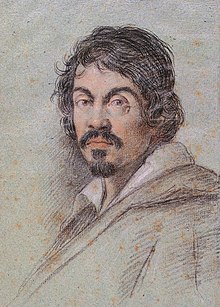Michelangelo da Caravaggio
| Caravaggio | |
|---|---|

Chalk portrait of Caravaggio by Ottavio Leoni, circa 1621.
|
|
| Born |
Michelangelo Merisi or Amerighi 29 September 1571 Milan, Duchy of Milan, Spanish Empire |
| Died | 18 July 1610 (aged 38) Porto Ercole, Grand Duchy of Tuscany |
| Known for | Painting |
| Notable work | See Chronology of works by Caravaggio |
| Movement | Baroque |
| Patron(s) | Cardinal Francesco Maria del Monte Alof de Wignacourt |
Michelangelo Merisi (Michele Angelo Merigi or Amerighi) da Caravaggio (Italian pronunciation: [ mikel'andʒəlo karaˈvadʒo ]; English: / maɪkəl'ændʒələʊ kærə'vɛdʒɪəʊ/; 29 September 1571 – 18 July 1610) was an Italian painter active in Rome, Naples, Malta, and Sicily between 1592 (1595?) and 1610. His paintings, which combine a realistic observation of the human state, both physical and emotional, with a dramatic use of lighting, had a formative influence on Baroque painting.
Caravaggio trained as a painter in Milan before moving in his twenties to Rome, where he lived and worked for several years, creating a considerable name for himself as an artist and as a violent, touchy and provocative man, until a brawl led to a death sentence for murder and forced him to flee to Naples.
In scarcely a year's sojourn in Naples, he rapidly established himself once more as one of the most prominent Italian painters of his generation, exploiting high-ranking connections. It was not long before these connections gave him an opening to travel on in 1607 to Malta, governed by the Order of Knights Hospitallers, whose upper echelons were an alliance of European nobility.
Caravaggio probably hoped that the Knights would provide a channel whereby he could obtain a pardon from the Papacy. Once more his talents made an instant impression, along with the support of noble patrons, to the point that after a year’s novitiate the Grand Master of the Order made him a knight. It seems to have been another brawl, this time with an aristocratic knight, and the arrival of news from Rome of his pending sentence there that led to his arrest and imprisonment at Valletta in October. His hopes dashed, he contrived to escape and flee at once, which before the end of 1608 led to his cancellation from the rolls of the Order. He made for Syracuse in Sicily, where he was received as a guest by a friend from his Roman days, and produced a number of works.
...
Wikipedia
